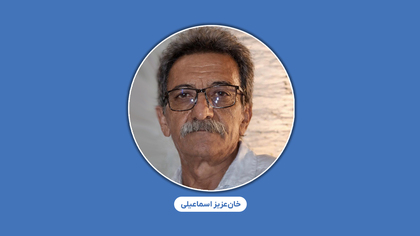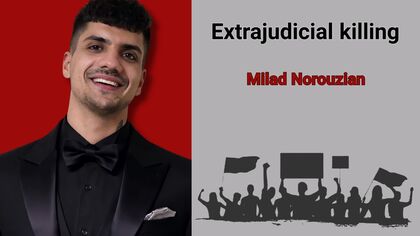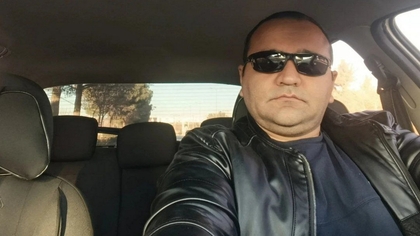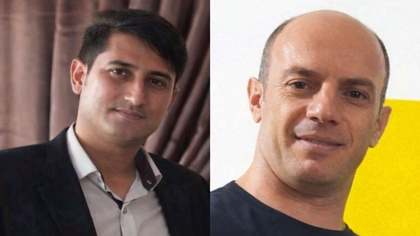Faces Behind the Crime: The Execution of Edris Ali, Azad Shojaei, and Rasoul Ahmad Rasoul
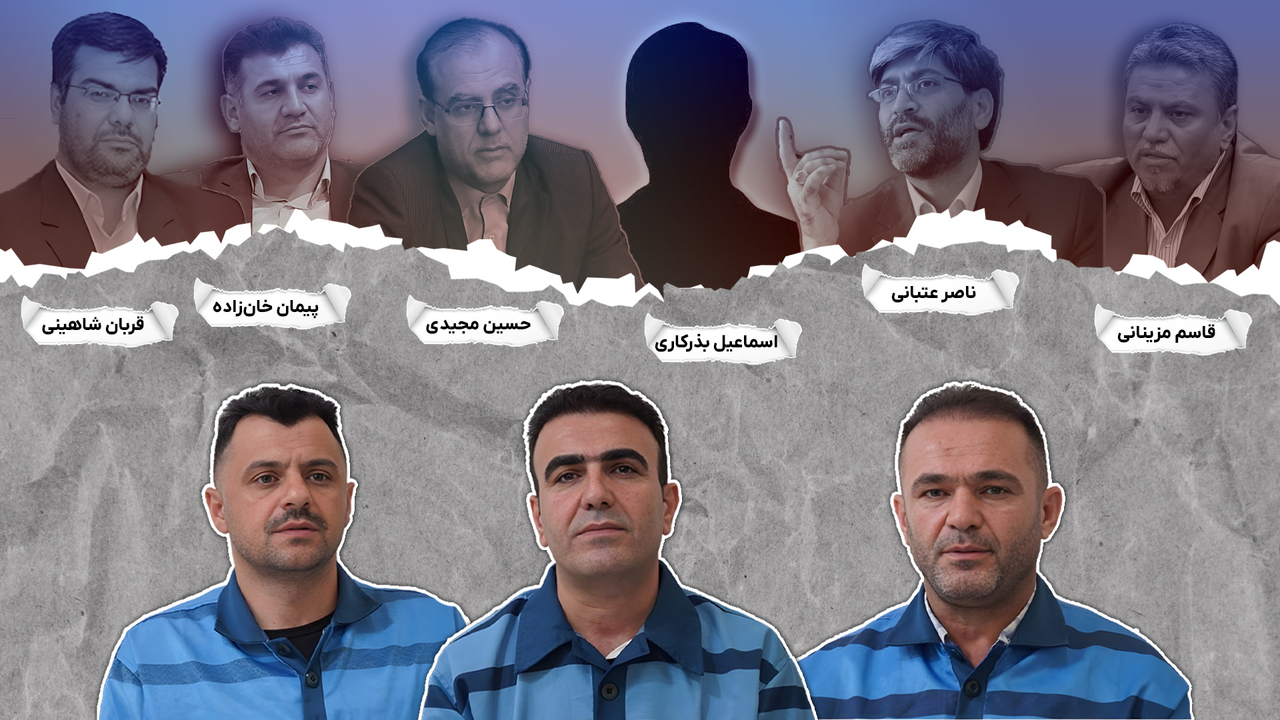
On the morning of Monday, June 24, 2025, three Kurdish political prisoners—Edris Ali, Azad Shojaei, and Rasoul Ahmad Rasoul—were executed in complete secrecy at Urmia Central Prison, without prior notice, without meeting the minimum standards of fair trial, and without informing their families. Their bodies were not returned to their families, and prison and judicial authorities have refused to provide any explanation. This secret execution is a clear case of judicial murder, carried out with the direct involvement of several senior judicial and security officials in West Azerbaijan Province.
At the head of this organized machinery of repression are:
- Ghasem Mazinani, Chief Judge of Branch 9 of the Supreme Court
- Ghorban Shahini, Judge of Branch 2 of the Revolutionary Court in Urmia
- Esmail Bazarkari, Assistant Judge of the same branch
- Peyman Khanzadeh, Director of Urmia Central Prison
- Naser Atabani, Head of West Azerbaijan Judiciary
- Hossein Majidi, Prosecutor of Urmia
These six judicial officials, from the issuance of the verdicts to the covert implementation of the executions, acted in full coordination with security agencies and bear direct responsibility for this crime.
Kurdpa’s exclusive report exposes the key roles played by these individuals and examines their records in cases involving repression, torture, death sentences, and systematic violations of political prisoners’ rights.
1. Ghasem Mazinani – Presiding Judge of Branch 9, Supreme Court of Iran
Ghasem Mazinani is a highly influential figure within the Islamic Republic’s judiciary. Since October 2022, he has served as the Presiding Judge of Branch 9 of the Supreme Court of Iran. Previously, he held the position of Senior Advisor at Branch 48 of the Supreme Court and Security-Legal Advisor at the General Inspection Organization. His career spans decades across various high-level judicial and oversight institutions.
Mazinani has been repeatedly named by human rights organizations for his role in rapidly affirming death sentences against political prisoners and protesters, often based on forced confessions extracted under torture. His branch has become a key mechanism for institutionalizing judicial executions at the final stage of appeals.
Judicial Background and Position
- Positions held: Security-Legal Advisor, General Inspection Organization (2010–2012); Senior Advisor, Branch 48 of the Supreme Court (2015–2021); since October 2022, Presiding Judge, Branch 9 of the Supreme Court.
- Role of Branch 9: Final authority on appeals in national security and capital punishment cases. Mazinani's rulings effectively serve as the last legal barrier before execution.
Notable Cases Confirmed by Branch 9 Under Mazinani
- "House of Isfahan" Case: On May 9, 2023, Mazinani confirmed the death sentences of Saleh Mirhashmi, Majid Kazemi, and Saeed Yaghoubi—three protesters convicted based on confessions obtained under torture and without fair trial guarantees.
- Four Kurdish Political Prisoners: In February 2024, Mazinani upheld the death sentences of Mohsen Mazloum, Pezhman Fatehi, Vafa Azarbar, and Hezhir Faramarzi, accused of "enmity against God" and "collaboration with Israel." The executions were carried out on January 29, 2024.
- Hamid Hosseinnezhad Heidaranlou Case: Despite evidence of innocence and a formal request for retrial, Mazinani confirmed the death sentence on March 25, 2025. The execution was carried out 79 days later in secrecy.
- Three Kurdish Political Prisoners: In June 2025, Mazinani confirmed the death sentences of Edris Ali, Azad Shojaei (both from Dooleh Garm, Sardasht), and Rasoul Ahmad Rasoul (from Sulaymaniyah, Kurdistan Region of Iraq), on charges of "enmity against God" and "corruption on Earth through collaboration with hostile foreign governments on behalf of Israel." The executions were carried out on June 24, 2025, at Urmia Central Prison.
Reactions and Criticism
- The campaign Faces of Crime has labeled Ghasem Mazinani as a state execution architect, compiling his human rights violations for international sanctions frameworks.
- Groups such as Edalatkhaneh and Iran Freedom have identified him as one of the key judicial figures responsible for the crackdown on 2022–2023 protesters.
- Repeated reports by Kurdpa characterize Branch 9 under Mazinani as a fast-track execution office for security-related cases.
Mazinani's tenure as head of Branch 9 since October 2022 has marked him as one of the primary enablers of politically motivated executions in Iran. Numerous documented cases indicate that he has routinely upheld death sentences without substantive legal review, placing him among the highest-ranking judicial officials implicated in grave human rights violations in the Islamic Republic.
2. Ghorban Shahini – Judge, Branch 2 of the Revolutionary Court in Urmia
Ghorban Shahini is a judicial official of the Islamic Republic of Iran who has held various local and provincial posts within the judiciary since the early 2010s. He currently serves as Judge of Branch 2 of the Revolutionary Court in Urmia, West Azerbaijan Province.
Judicial Positions and Career History
- 2012: Alternate Judge at the General Court of Bam, Kerman Province.
- 2017: Appointed as Chief Judge of Branch 1 of the General and Revolutionary Court of Rigan and Head of the Rigan Judiciary.
- Until August 27, 2023: Head of the Judiciary in Shahin-Dezh, West Azerbaijan Province.
- Present: Judge of Branch 2, Revolutionary Court of Urmia, a central venue for political and national security trials in the region.
Notable Cases and Judicial Conduct
- Conviction of Child Rights Activists (2012): One of Shahini’s earliest known rulings involved sentencing seven members of the “Rahavard Mehr va Danesh” charity association and four affiliates to a total of 27 years in prison for their child advocacy work in Bam. According to documentation from the Baha’i Rights Documentation Center, ten of those sentenced were Baha’is. Their one-year sentences were later conditionally suspended for five years.
- Death Sentences for Three Kurdish Political Prisoners (2023–2025): Shahini played a central role in the sentencing of Azad Shojaei, Edris Ali, and Rasoul Ahmad Rasoul to death on charges of “espionage for Israel” and alleged involvement in the transfer of equipment used in the assassination of nuclear scientist Mohsen Fakhrizadeh. The men were held in solitary confinement without access to legal counsel and subjected to torture and coercion to extract confessions. The sentences were issued in October 2023, and the executions were carried out in secrecy on June 24, 2025, at Urmia Central Prison.
- Sentencing of Civil Society Activists: In February 2025, Hamid Chapati, a Kurdish civil activist from Urmia, was sentenced by Shahini to three months of imprisonment on charges of “propaganda against the state and disturbing public opinion.” Chapati had been arrested in October 2024 after being summoned by the Security Police and was later released on bail. Although the sentence was minor, it illustrates Shahini’s role in criminalizing civic engagement.
Public Visibility and Media Coverage
In official state media, Shahini’s name has primarily appeared in the context of administrative appointments or institutional achievements during his tenures in Rigan and Shahin-Dezh. Outlets such as Fars News, ISNA, and Mizan News Agency have published statements from him related to judiciary efficiency, legal service access, and prisoner aid initiatives. Notably, when the Judiciary issued a report on the espionage case in 2023, Shahini’s name was omitted—a common practice in politically sensitive rulings involving death penalties and national security charges.
Background and Profile
Public information regarding Shahini’s educational background or personal affiliations is limited. He is a lay judge (non-clerical), likely trained in law or judicial sciences. His career trajectory—from a local judge in southern Kerman to a key figure in politically charged trials in West Azerbaijan—reflects the judiciary’s trust in his loyalty and punitive approach. His consistent issuance of harsh sentences in both civil and security-related cases, irrespective of geographic context, suggests a systemic pattern of judicial repression.
There is no official record of political affiliations, and he is a state-appointed judge operating under the supervision of provincial judicial chiefs. His personal background has been kept out of public view, possibly due to his involvement in sensitive and high-profile security cases.
3. Esmail Bazarkari – Associate Judge, Branch 2 of the Revolutionary Court in Urmia
Esmail Bazarkari is a low-profile judicial figure within Iran’s security judiciary, with a background in both Revolutionary and Military Courts in Urmia, West Azerbaijan Province. Despite the lack of public records or photographs, his confirmed involvement in at least two high-profile political cases has linked him directly to severe human rights violations.
Documented Judicial Roles
- In late 2017, Bazarkari served as Associate Judge at Branch 1 of the Military Court One of West Azerbaijan Province, alongside Presiding Judge Seyed Ebrahim Khalil Hosseini and Judge Reza Samimi. The court sentenced Sediq Eini, a Kurdish political prisoner, to 10 years in prison and exile to Ardabil Prison. This ruling was publicly reported in April 2018 by Kurdpa, marking the first time Bazarkari’s name appeared in a rights monitoring report.
- In October 2023, Bazarkari acted as associate judge to Ghorban Shahini in Branch 2 of the Revolutionary Court in Urmia in the case of Edris Ali, Azad Shojaei, and Rasoul Ahmad Rasoul—three Kurdish political prisoners accused of “espionage for Israel”. The three men were sentenced to death following months of incommunicado detention, torture, and forced confessions. The executions were carried out secretly on June 24, 2025, in Urmia Central Prison.
Public Information and Accountability
Bazarkari’s name has never been published in official judiciary bulletins, appointment notices, or state-affiliated media. To date, Kurdpa remains the only verified source documenting his judicial involvement in politically sensitive cases.
His inclusion in two major security-related rulings—one involving a long-term prison sentence and another culminating in secret executions—demonstrates his direct complicity in grave judicial abuses, despite the absence of a broader public profile.
As such, Esmail Bazarkari exemplifies the category of “faceless judges”—figures who operate behind closed doors in Iran’s judiciary to issue or facilitate punitive rulings against political and ethnic minorities, shielded from scrutiny by the lack of official transparency.
4. Naser Atabati – Chief Justice of West Azerbaijan Province
Naser Atabati serves as the Chief Justice of West Azerbaijan Province, making him the highest-ranking judicial authority in the region, headquartered in Urmia. His career path spans from homicide investigator in Qom to Prosecutor of Ardabil, Prosecutor of Urmia, and since May 2021, Chief of the Provincial Judiciary. Atabati holds a Ph.D. in Criminal Law and Criminology and is considered the principal figure guiding security-focused prosecutions in coordination with Urmia’s Prosecutor Hossein Majidi. mizanonline.ir.
Career Overview
- Prosecutor of Ardabil (2014–2020): Known for overseeing and publicly defending death and qisas (retribution) sentences, including at least two executions in September 2016, and managing the high-profile 2017 murder case of Atina Aslani, a child victim whose death shocked the country. etemadonline.com
- Prosecutor of Urmia (2020–2021): Served until March 2021, when a new appointee replaced him. Shortly thereafter, he was promoted to lead the entire judiciary of West Azerbaijan Province.irna.ir
- Chief Justice of West Azerbaijan (2021–present): Upon assuming office, Atabati established "Special Case Committees" to expedite politically sensitive and security-related rulings, and has frequently conducted on-site inspections of prisons and courts alongside the provincial prosecutor. mizanonline.ir
Documented Human Rights Violations
- Threats of Amputation (June 2024): During an official visit to Urmia Central Prison, Atabati and the prosecutor reportedly threatened four detainees convicted of theft with immediate finger amputation, in direct violation of international norms against cruel, inhuman, and degrading punishment. iran-hrm.com
- Cover-up of Protester Killings (Autumn 2022): Atabati publicly denied the responsibility of security forces in the deaths of Fereshta Ahmadi and Esmail Moloudi, attributing the killings to "unknown actors" or "personal gunfire." iranwire.cometemadonline.com
- Suppression of Freedom of Expression (November 2023): Issued judicial orders targeting "rumor-mongers" over allegations against the provincial governor, calling for the prosecution of journalists and social media users. asriran.com
Notable Cases and Actions
- Release of Austrian National (September 2024): Publicly announced the release of Christian Weber, an Austrian national, citing "Islamic clemency," without disclosing charges or legal proceedings.iranwire.com
- Security Case Consultative Committee (June 2025): Presided over sessions to fast-track heavy sentences in four provincial national security cases.mizanonline.ir
Profile and Role
Atabati represents a clear model of the “security-manager judge”—a judiciary figure who has consistently served on the frontlines of harsh sentencing, repression, and justification of punitive measures. During the 2022 protests, he acted as a spokesperson for the crackdown, and in 2024–2025 has escalated the judiciary’s role in issuing corporal punishments and threats against activists.
His career in Ardabil and Urmia has reinforced his position as a trusted executor of the Islamic Republic's security agenda. Due to his documented record of threatening detainees and facilitating torture or cruel treatment, Atabati qualifies for inclusion in international human rights sanctions regimes, such as the Magnitsky framework.
5. Hossein Majidi – Prosecutor of Urmia
Hossein Majidi has served as the Public and Revolutionary Prosecutor of Urmia since February 24, 2021. His judicial career includes previous roles as Prosecutor of Khoy and Shahin-Dezh, and Chief Judge of Urmia’s General Courts. He also heads the Anti-Narcotics Committee of West Azerbaijan Province. Majidi is a central actor in judicial repression in western Iran, known for implementing death sentences, authorizing amputations, threatening protesters, and pursuing high-profile “Mossad espionage” cases.
Career Trajectory and Appointments
- 2017–2018: Prosecutor of Shahin-Dezh and Khoy
- Until February 2021: Chief Judge of General Courts in Urmia facesofcrime.org.
- Since February 2021: Public and Revolutionary Prosecutor of Urmia, serving as the primary judicial liaison to the Intelligence Ministry and IRGC in West Azerbaijan Province
Involvement in Security Cases and Harsh Punishments
- Executions of Kurdish Political Prisoners:
- Firooz Mousalou (June 20, 2022) facesofcrime.orgfacesofcrime.org.
- Mohyeddin Ebrahimi (March 17, 2023)
- These executions were conducted under Majidi’s direct supervision.
- Amputations by Guillotine:
- On October 30, 2024, four fingers were amputated from Shahab and Mehrdad Teimouri, under orders from Majidi and prison chief Peyman Khanzadeh. Reports confirm that Majidi personally ordered the burial of the amputated fingers. radiozamaneh.comkurdistanhumanrights.org.
- Continued Threats of Corporal Punishment:
- In July 2024, Majidi threatened four more detainees with imminent amputations during a prison visit alongside Chief Justice Naser Atabati.kurdistanhumanrights.org
- In March 2025, Iran HRM reported that three more prisoners were at risk of limb and eye retribution (qisas) under pressure from Majidi. iran-hrm.com.
Role in Protest Suppression and Securitization
- During the 2022–2023 protests, Majidi was identified as a key actor in the crackdown on demonstrators in Urmia. facesofcrime.org.
- The Faces of Crime campaign lists him among the perpetrators of state violence and extrajudicial killings. facesofcrime.org.
He is accused by multiple rights groups of overseeing:
- The arbitrary arrest of Kurdish activists
- Obstructing the return of bodies of killed protesters to their families
Internal Cases and Media Campaigns
- “Mossad Espionage” Case (June 2025): Announced the arrest of five alleged Mossad agents in Urmia—widely covered in Mehr News and Donya-e-Eqtesad. mehrnews.commehrnews.com.
- Dog-Walking Ban (June 2025): Declared a crackdown on dog-walking in public spaces, citing “public rights.” etemadonline.com.
- Bread Hoarding Case (July 2025): Ordered the arrest of 27 bakery managers on charges of wheat flour hoarding. mehrnews.com.
- Child Electrocution in Park: Following the death of a 9-year-old girl, issued a 24-hour deadline for accountability.khabaronline.irborna.news.
- Schoolgirl Poisonings: Claimed to be firmly pursuing investigations into a wave of poisonings at girls’ schools in Urmia. hawzahnews.comsharghdaily.com.
Human Rights Criticism and International Accountability
Hossein Majidi faces serious allegations of:
- Issuing and accelerating cruel and degrading punishments (executions, amputations) in violation of due process
- Using the judiciary to suppress civic dissent and protests
- Employing politicized security cases to justify crackdowns
Human rights organizations such as the Kurdistan Human Rights Network, Iran HRM, and Faces of Crime have called for his inclusion in Magnitsky-style sanctions and universal jurisdiction prosecution.iranhrs.orgiran-hrm.com.
6. Peyman Khanzadeh – Warden of Urmia Central Prison
Peyman Khanzadeh, the current Warden of Urmia Central Prison, is a central figure in the apparatus of systematic repression inside Iranian prisons, particularly in Kurdish regions. Since his initial appointment as Deputy Warden in 2017, Khanzadeh has been repeatedly implicated in serious human rights violations, including torture, cruel and inhuman punishments, and psychological abuse of both prisoners and their families.
Career Milestones and Security Ties
- May 9, 2017: Ordered forced participation of inmates in the presidential election during his tenure as Deputy Warden.
- October 16, 2020: Named in a human rights report for close collaboration with IRGC Intelligence while still serving as deputy.
- June 5, 2023: Officially appointed as Warden of Urmia Prison. His term began with visits to the women’s ward and public declarations of reform (prisons.ir).
Since his appointment, Khanzadeh has escalated institutional repression, particularly targeting Kurdish and political prisoners.
Documented Human Rights Violations
- Mass Inmate Protest (September 2023): Over 800 prisoners signed an open letter demanding his removal, citing abuse, humiliation, rising suicides, medical neglect, and family harassment.
- Violent Raids (February 28, 2025): Ordered a violent assault by prison guards on political prisoners, resulting in serious injuries. One prisoner attempted self-immolation. Injured detainees were denied medical care.
- Judicial Amputations (October 29, 2024): Oversaw the amputation of four fingers from two brothers using a guillotine—a punishment condemned internationally as torture. Khanzadeh reportedly ordered the burial of the severed fingers inside the prison grounds. prisons.ir
- Severe Conditions (Winter 2024 – Spring 2025): Repeated reports documented lack of hot water, spoiled food, overcrowding, and confiscation of personal items. Khanzadeh and the prison’s supervising judge were named as directly responsible. Official inspections ignored prisoner complaints and praised his “orderly administration.”
- Secret Execution of Hamid Hosseinnezhad Heidaranlou (April 17–20, 2025): Khanzadeh falsely told the family that the prisoner had been taken by Intelligence and denied knowledge of his whereabouts, while the execution was in fact already in process. Prosecutor Hossein Majidi echoed this disinformation. For three days, the family staged protests outside the prison with no official information provided.
- Mass Executions Under His Tenure: Dozens of prisoners were executed during Khanzadeh’s time as warden, many without notification to families or legal representatives.
Profile and Repressive Conduct
Khanzadeh is emblematic of security-aligned prison administrators in Iran who facilitate repression, torture, and extrajudicial punishments under the guise of judicial order. His actions constitute:
- Psychological torture and deliberate deception of families
- Physical torture and cruel, inhuman, and degrading punishment
- Systematic repression of political and ethnic minority prisoners
- Active collusion with IRGC Intelligence and the Intelligence Ministry
Multiple rights organizations—including Iran HRM, Kurdistan Human Rights Network, and Faces of Crime—have called for international accountability, recommending Khanzadeh’s inclusion in Magnitsky-style sanctions lists and pursuit under universal jurisdiction for crimes against humanity.
Testimonies from former prisoners, families, and corroborating medical and legal documentation are essential to supporting criminal complaints and international advocacy targeting his role.
These findings are based on documentation gathered from official government websites, independent human rights organizations, and reputable media sources. It is likely that the actual extent of repression committed by these judicial figures may be even greater than what is currently documented.
If you or your relatives have been directly or indirectly subjected to judicial repression or abuse by any of these officials of the Islamic Republic, you are encouraged to contact Kurdpa to share your testimony or documentation.
Related Report:
The Executions of Edris Ali, Azad Shojaei, and Rasoul Ahmad Rasoul – Rushed, Secretive, Unjust, Carried Out Without Notice to Families or Legal Counsel, and Withheld Bodies
Compiled by: AWin Mostafazadeh
